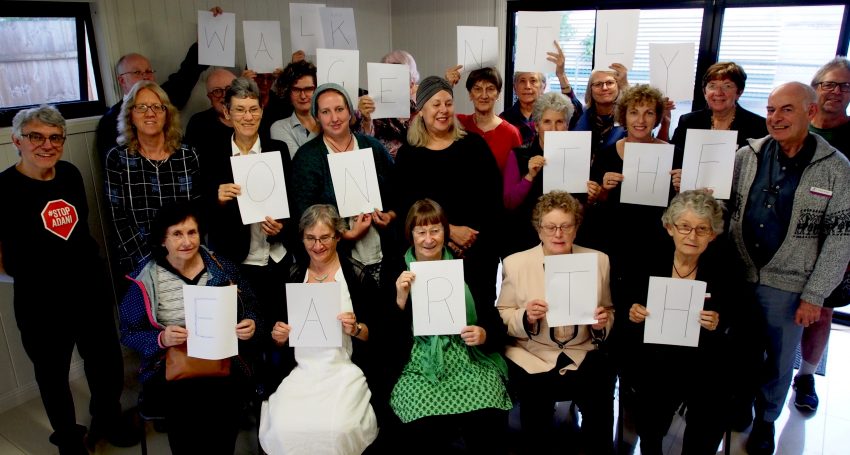Angligreen responds to the IPCC Special Report on Global Warming
Features
Chair of Angligreen The Rev’d Peter Moore reflects on the recently released IPCC Special Report on Global Warming and suggests practical ways that we can respond as Christians to support climate justice

The recent release of the Intergovernmental Panel on Climate Change IPCC Special Report on Global Warming of 1.5°C shows how the world is lagging dangerously far behind the targets needed to avoid catastrophic levels of climate disruption. The super-storms being experienced today, the droughts, bushfires, bleaching of coral reefs, food insecurity and sea level rise are set to worsen, even if we are able to limit warming to 1.5°C. The world is presently on track for around 3°C of warming – a level that jeopardises the future of civilisation.
Responding here in Australia
Limiting warming to 1.5oC will require the very rapid decarbonisation of the global economy. For Australia, this means no new coal, a shift to 100% renewable energy as soon as possible, and reaching zero emissions well before mid-century. Every delay will cost lives and livelihoods, especially for those already in poverty.
Regrettably, Australia’s emissions are continuing to rise and our government has no plan to help tackle the climate crisis.
How are we, as Christians at the grassroots, to respond?
The Very Rev’d Dr Peter Catt, Anglican Dean of Brisbane, said that, “Care for creation in all its forms is a moral action, a moral imperative. As our world changes, the most vulnerable among us are bearing the greatest cost of the impacts of climate change.”
Thus, Anglicans, Catholics, Evangelical Christians and people of a range of other religious traditions are embracing the global campaign, ‘Living The Change: Faithful choices for a flourishing world’. The campaign challenges believers in various spiritual traditions to make concrete commitments to living more simply, in line with their deeply held beliefs and values.
Advertisement
Anglican response
With the UN warning that irreversible catastrophic climate changes are now a possibility, The Rev’d Canon Dr Jeff Golliher, Adviser for the Environment, Climate Change and Sustainable Communities at the Anglican Communion Office at the United Nations and The Rev’d Canon Dr Rachel Mash, Environmental Coordinator for the Anglican Church of Southern Africa, have written:
“The IPCC report points to the scale and depth of changes that we must set in motion – beginning now. These involve nearly every part of our lives, especially economics, food, water, energy systems, and political will.”
“In the Anglican Communion, we have already begun to implement bold collaborative strategies in our Provinces that provide opportunities to put the Fifth Mark of Mission into practice more effectively, and to strengthen the Anglican Communion at the same time.
“The word ‘collaboration’ is crucial. Provinces are working with the Anglican Communion Environmental Network (ACEN) and the Anglican Alliance to make this happen. Two important regional gatherings have taken place this year – the first in South America and the second in Southern Africa. These are both areas where the most vulnerable are already experiencing hectic climate change from drought and flooding.”
Advertisement
The recent Brisbane Synod passed a motion calling on “Diocesan Council, in consultation with the Social Responsibilities Committee and ANGLIgreen, to develop a process whereby we are able to examine our successes, our failures and ways in which we can better respond to the undertakings we made in 2009 when we adopted the PROTECTION OF THE ENVIRONMENT CANON 2007 of the Anglican Church of Australia”.
Living the Change
Jesus himself was born in a stable, had nowhere to lay his head and relied on the hospitality of others to carry out his mission. Jesus called on his followers to lay up treasure for themselves in heaven, not on earth (Matthew 6:19-21), and to give to the poor and hungry (Luke 3:11).
In October, faith communities celebrated a ‘Week of Living the Change’ with eight events in Australian capital cities and regional centres, and 70 events globally. People who attended were encouraged to make concrete long-term commitments to low-carbon lifestyle changes in the areas of transport, home energy use and diet.
There are indeed sacrifices, but there are many co-benefits that come with simpler lifestyles. Just as following Jesus brings fullness of life, moving towards plant-based diets, walking and cycling bring health benefits; using public transport and reducing air travel slows down the frenetic pace of life; more energy efficiency and renewable energy means less pollution; and, congruence with personal values enhances self-worth.
So which changes will be of most benefit to protecting the climate? For many, the imagination seems to leap to recycling, switching off lights or replacing lights with LEDs. However, replacing incandescent bulbs with LEDs save around 470 kg CO2e (carbon dioxide equivalent) in a year, while a 2kW solar array avoids around 2,600 kg of C02e. The most impactful step for the average household, however, is to switch to GreenPower, which would avoid around 5,900 kg of CO2e pa.
Probably the most impactful actions an individual can take are to avoid long-haul flights (Melbourne to London return causes around 6,000 kg CO2e). For more on emissions which can be avoided, visit the ARRCC website.
We are Living the Change, and we invite all people of goodwill to join us by committing online now.







